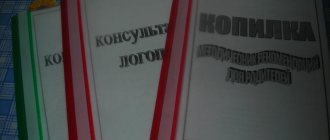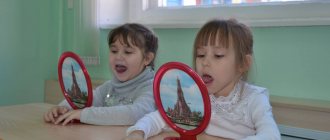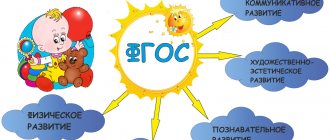Developed by: teacher-speech therapist Olikova Alla Yurievna
MBDOU "General developmental kindergarten No. 1 "Smile" Lukhovitsy
Type of project : correctional - developmental, creative, informational - educational, gaming.
Project participants: children of middle, senior, preparatory groups, educators, parents, specialists.
Goal: correction and activation of speech in preschool children in the process of creative activity, promotion of speech therapy knowledge.
Tasks:
- Promote cognitive and speech activity of children.
- Create a specially organized environment that encourages the child to be active in the educational process and strive for creativity.
- Encourage children to verbally communicate with peers and adults;
- To form practical skills in children of correct speech (phonetically clear, lexically developed, grammatically correct).
- To develop higher mental functions (HMF) in preschool children (memory, attention, thinking, perception).
- Develop children's sound analysis skills.
- Exercise children in the correct pronunciation of sounds using tongue twisters rich in reinforced sounds.
- Develop coherent speech and improve the overall sound of speech (tempo, rhythm, diction, intonation expressiveness) through theatrical activities.
- Develop articulatory and fine motor skills, speech breathing.
- To introduce teachers and parents to the work of a speech therapist in kindergarten.
- Involve teachers and parents in the correctional and developmental process.
- Arouse the interest of preschoolers in speech therapy games and the need for them.
Relevance.
Every year the number of children with speech disorders in kindergartens increases, and it becomes increasingly difficult for speech therapists working in preschool institutions to organize effective correctional work. Therefore, along with traditional speech therapy classes, new forms of work are used. One of the forms of such work is “Speech Therapy Week,” during which speech therapy knowledge is also promoted among teachers and parents.
To increase the effectiveness of speech therapy work in the educational process, project activities are used. The project method is a pedagogical technology, the core of which is the independent, research, cognitive, playful, creative, productive activity of children, in the process of which the child gets to know himself and the world around him, and translates his knowledge into real products. In the educational process of a preschool educational institution, project activities are of a collaborative nature. The child ceases to be an object of pedagogical influence and becomes an active participant in creative activity, the purpose of which is to activate his own resources in the process of learning and development.
The relevance is due to the need to resolve issues aimed at increasing the effectiveness of correctional and developmental work with preschool children in kindergarten conditions.
Develop higher mental functions; phonemic awareness; general and fine motor skills of the fingers; creativity, coordination of speech with movement.
Forms of work with preschoolers:
- Wall newspaper “Day of Polite Words”
- Talking with children about polite words
- Organized educational activities
- Theatrical event
- Reading and learning riddles
- Didactic games
- Flash mob with crafts “The first letter of my name”
- Exhibition of children's works on the topics: “The first letter of my name”, “Funny tongue twisters in pictures”, “My favorite fairy tale”.
Interaction with parents:
- Consultations for parents
- Involving parents in making crafts with their children
- Involving parents to participate in the master class “The Tale of a Merry Tongue”
Activities of teachers
- Participation in the pedagogical show-competition “Do-It-Yourself Theater Corner”.
- Selection of literature about polite words
- Selection of illustrations for the conversation
- Organized educational activities
Project activity products:
presentation, exhibitions of drawings, photo reports, wall newspaper, crafts, booklets, notes.
Timing and stages of project implementation:
- Organizational and preparatory (from November 5 to November 8, 2019)
- Main (from November 11 to November 15, 2021)
- Final (November 15, 2019)
The project is carried out in three stages:
- Organizational and preparatory: designation of the project topic, definition of the goal and main tasks, development of an action plan aimed at correcting and enhancing speech activity.
- Main: carrying out activities aimed at correcting and enhancing speech activity in accordance with the plan.
- Final: summing up the events, photo reports, presentation of the project “Speech Therapy Week “We speak beautifully, correctly”
Methods and techniques used in the implementation of the project:
- Practical methods of speech therapy include exercises, games and modeling.
- Visual methods include observations, looking at drawings, paintings, watching videos, listening to audio recordings, as well as showing a sample task and method of action.
- Verbal methods include story, conversation, reading.
Expected results.
Children's interest in speech therapy classes will increase, their relationship with parents and teachers will improve, and the effectiveness of correctional work will increase.
Thematic planning for project implementation
Project implementation period
| Event theme | Responsible | Form of conduct | |
| November 11, 2021 | Opening of speech therapy week - “We speak beautifully, correctly” | Teachers of middle, senior, preparatory groups, parents, specialists. | Wall newspaper “Day of Polite Words”, photo report |
| "Day of Polite Words" | Teachers of middle, senior, preparatory groups, specialists. | Conversation with children, photo report | |
| “The first letter of my name” - preparatory groups. “Fun tongue twisters in pictures” – senior groups “My Favorite Fairy Tale” - middle groups | Parents, children | Crafts, pictures, photo report | |
| November 12, 2021 | Day of articulation, breathing, finger gymnastics “The Tale of How a Cheerful Tongue and Fingers Were Friends” | Teachers - speech therapists | Classes, notes, photo report |
| Finger games | Teachers - speech therapists | Classes, notes, photo report | |
| November 13, 2021 | A fairy tale as part of theatrical activities in a preschool educational institution | Specialists and children | Theatrical event, fairy tale script, photo report |
| Pedagogical review - DIY theater corner competition | Educators, specialists | Review competition, photo report | |
| November 14, 2021 | Master class for parents “The Tale of a Merry Tongue” | Parents, children, specialists | Master class, notes, photo report, booklets |
| Compiling a story based on a series of plot pictures for older children | Teachers and children | Classes, notes, photo report | |
| November 15, 2021 | Event “Riddle-Guessing Tournament” | Teachers, children, specialists | Photo report, event summary |
| Closing of the speech therapy week “We speak beautifully, correctly”, summing up the results of the pedagogical review - the Do-It-Yourself Theater Corner competition, the “Fun Tongue Twisters in Pictures” competition. Flash mob with fakes “The first letter of my name” | Teachers, children, specialist | Photo report |
Speech therapy project “Talk Tongue”
Short-term speech therapy project “Talk Tongue”
Implementation period: September 2021 – December 2017
Developed by a speech therapist teacher
1 KVK Emelyanova A.V.
2017
The project is aimed at building a system of preventive work for children with speech disorders with pedagogical influence and coordination of parents in conscious activities on the speech development of preschool children
Analysis of the situation
In the sound of the voice, in the eyes
and in the whole appearance of the speaker
concluded no less
eloquence than
in the choice of words (Euripides)
In our kindergarten, speech therapist classes are attended by pupils who have the status of a child with disabilities. These children attend classes with a speech therapist based on the collegial opinion of the PMPK, but there are children who need speech correction. Based on the results of diagnostics of the senior and preparatory groups for August - September 2021, I identified students who had disorders of one or two sounds while the remaining aspects of speech were intact. These children also need specialist help.
Violations in the pronunciation of sounds in children appear in preschool age, which is when they should be corrected. Defects in sound pronunciation not only affect the child’s emotional state, but also subsequent learning at school. Defects in sound pronunciation prevent a child from fully opening up when communicating with adults and peers. Such manifestations as shyness, secrecy, and low self-esteem appear.
In such a situation, parents should take the most active position. Their involvement in the control stage during sound production and automation plays one of the most important functions. Parents are the authority for the child. The joint efforts of a specialist and parents can work a miracle - children who have difficulty making sounds by imitation, feeling the support of adults, quickly overcome the difficulties that arise. This approach helps to find a way out of the situation without aggravating it.
Article 44 of the Law of the Russian Federation “On Education” states: 1. Parents (legal representatives) of minor students have a priority right to educate and raise children over all other persons. They must
lay the foundations for the physical, moral and intellectual development of the child’s personality.
2. State authorities and local governments, educational organizations provide assistance to parents (legal representatives) of minor students in raising children, protecting and strengthening their physical and mental health, developing individual abilities and the necessary correction of their developmental disorders.
Competent and organized work on the prevention of speech disorders will significantly reduce the number of children who need the help of a speech therapist. A new form of providing speech therapy assistance to children and their parents will simultaneously strengthen the interaction between the kindergarten and the family.
During speech therapy work, the preschooler and parents learn:
- to interact;
- show tact and patience in communication;
- understand the complexity of the work being performed despite its apparent ease;
-under the guidance of a speech therapist teacher, form the correct articulatory structure of the disturbed sound;
-develop an air stream necessary when pronouncing many sounds;
-use game exercises to develop phonemic hearing;
- automate the sound in speech, observing a certain sequence;
- achieve maximum results given the physical and psychological capabilities of the child;
-parents increase the level of pedagogical competence in speech development.
For our preschool educational institution, such a project and a way to solve the problem of students through the efforts of parents and a speech therapist teacher becomes the most relevant.
The project was compiled taking into account:
-Law on Education of December 29, 2012, which gives equal rights to receive assistance from specialists;
- Federal State Educational Standard of Education dated October 13, 2013, which puts forward one of the principles of preschool education: cooperation between the Organization and the family, assistance and cooperation of children and adults, recognition of the child as a full participant in educational relations.
-Basic general education program for preschool education, 2017
-Results of speech therapy diagnostics for August – September 2017
-Psychological characteristics of children of senior preschool age
Project type:
Information-practice-oriented
Implementation period
:4 months
Project participants
: teacher-speech therapist, preschool children of senior preschool age, their parents
Children's age
: 5-6 years
Form of conduct
: group, individual
Objective of the project:
building a system of preventive work for children with speech disorders with pedagogical influence and coordination of parents to conscious activities on the speech development of preschool children
Tasks
:
-coordinate parents and their children with speech disorders to participate in the project;
-develop an action plan for the prevention of speech disorders in senior group students;
-provide advisory and methodological assistance to parents on the correction of speech disorders of preschool children;
-monitor the activities carried out and their effectiveness.
Expected results.
-increasing the competence of parents, intensifying their conscious interaction with the child to overcome speech disorders and, as a result, partial correction of speech defects in preschool children.
-increasing the authority of preschool educational institutions among parents of pupils, increasing the share of family participation in the educational process.
Selection of material
: presentations, leaflets with advice from a speech therapist, invitation cards according to the number of project participants, literature exhibition, teaching aids
Stages of work on the project
:
Stage 1 - preparatory (information and analytical).
Tasks:
-analysis of the results of speech therapy diagnostics;
-defining the goals and objectives of the project;
-formation of groups of pupils according to groups of impaired sounds;
-project development;
— select materials for creating presentations, memos, literature exhibitions and teaching aids
Stage 2 – main (practical)
-develop and test preventive measures for joint activities of students and their parents
Stage 3 – final (control and diagnostic)
-analysis of the effectiveness of a speech therapist teacher’s work with parents on issues of children’s speech development and the effectiveness of correctional work with children.
-conduct a repeat speech therapy examination of the pupils participating in the project after 1 month;
— analyze the duration of joint work of pupils and their parents at home
Long-term project implementation plan
Stage 1 - preparatory (information and analytical).
| № | Subject | Forms and methods of work | Goals | Result | Responsible | Implementation period |
| 1 | Incoming diagnostics at the beginning of the school year | Speech therapy examination of pupils | Identification of pupils at risk and with sound pronunciation defects | 1Registration of examination protocols 2Assessing the level of speech development of children | Teacher speech therapist | Aug. Sept |
| 2 | Creating a Project | 1 requests from parents for correction of speech disorders 2collection of information 3design of the project and its approval | 1competent construction of a work system 2creation of a project taking into account the needs of children and parents | 1Design of a printed version of the project 2Development of a system of activities for children and their parents | Teacher speech therapist | Aug. Sept |
| 3 | Development of instructions for parents | Selection of materials, exercises | Increasing the pedagogical competence of parents Coordination of actions between a speech therapist and a parent to correct speech disorders | Preparation of reminders on the number of parents for each event | Teacher speech therapist | September October November December |
Stage 2 – main (practical)
| № | Subject | Forms and methods of work | Goals | Result | Responsible | Implementation period |
| 1 | L-l-screaming sounds | Master class on correcting deficiencies in the pronunciation of the sound “L” Presentation Reminders | Increasing the pedagogical literacy of parents. Familiarization of parents with diagnostic results. Testing exercises and games for staging and automating sounds. | Parents' mastery of basic techniques for producing and automating sounds. Analysis of parent surveys Reviews from parents Preparation of the master class protocol | Teacher speech therapist | September |
| 2 | R-r-growl sounds | Master class on correcting deficiencies in the pronunciation of the sound “R” Presentation Reminders | Increasing the pedagogical literacy of parents. Familiarization of parents with diagnostic results. Testing exercises and games for staging and automating sounds. | Parents' mastery of basic techniques for producing and automating sounds. Analysis of parent surveys Reviews from parents Preparation of the master class protocol | Teacher speech therapist | October |
| 3 | Whistling sounds | Master class on correcting deficiencies in pronunciation of sounds "S, Z, C" Presentation Reminders | Increasing the pedagogical literacy of parents. Familiarization of parents with diagnostic results. Testing exercises and games for staging and automating sounds. | Parents' mastery of basic techniques for producing and automating sounds. Analysis of parent surveys Reviews from parents Preparation of the master class protocol | Teacher speech therapist | November |
| 4 | Hissing sounds | Master class on correcting deficiencies in pronunciation of sounds "Sh, Sh, F, Ch" Presentation Reminders | Increasing the pedagogical literacy of parents. Familiarization of parents with diagnostic results. Testing exercises and games for staging and automating sounds. | Parents' mastery of basic techniques for producing and automating sounds. Analysis of parent surveys Reviews from parents Preparation of the master class protocol | Teacher speech therapist | December |
Stage 3 – final (control and diagnostic)
| № | Subject | Forms and methods of work | Goals | Result | Responsible | Implementation period |
| 1 | Interim diagnostics for the middle of the school year | Speech therapy examination of pupils | Identification of dynamics after the events | 1Registration of examination protocols 2Assessing the level of speech development of children | Teacher speech therapist | December - January |
| 2 | Analysis of the effectiveness of the activities carried out | Parent survey. Processing the results of reviews, questionnaires, diagnostic cards | Determining the level of achievement of the assigned tasks. Taking into account the wishes and feedback of parents Identify the need to continue the project | Registration of monitoring results. Making a presentation, showing it at the methodological council | Teacher speech therapist | Aug. Sept |
Methodological support
:
1Articulation of sounds in a graphic image. Educational and demonstration material. Appendix to the book by E.V. Novikova “Speech Therapy ABC”. A new method of teaching reading. – M.: “GNOM Publishing House”, 2011. – 48 p.
2Bachina O.V., Samorodova L.N. Interaction between a speech therapist and the family of a child with speech impairments. - M.: Sphere shopping center, 2009.
3Vorobyova T. A., Krupenchuk O. I. Speech therapy games with a ball. – St. Petersburg: Litera Publishing House, 2010.
4Vorobeva T.A., Krupenchuk O.I. Speech therapy exercises: Articulation gymnastics. – St. Petersburg: Litera Publishing House, 2012. – 64 p.
5Wiesel, T.G. Speech therapy exercises for every day to develop clear speech. – M.: V. Sekachev, 2005. – 16 p.
6Innovative forms of interaction between preschool educational institutions and families. /auth. – comp. N. M. Sertakova. – Volgograd: Teacher, 2014.
7Miklyaeva N. G., Lagutina N. F. Commonwealth: a program for interaction between family and kindergarten. – M.: Moziaka – synthesis, 2011
8Nishcheva N.V. Fun articulation gymnastics. – SPb.: PUBLISHING HOUSE “CHILDHOOD-PRESS” LLC, 2009. – 32 p.
9Repina Z. A., Buiko V. I. Speech therapy lessons. – Ekaterinburg: “Litur”, 1999.
10Filicheva T. B. Chirkina G. V. Programs of compensatory preschool educational institutions for children with speech disorders. – M., 2008.
11 Khvattsev M. E. Speech therapy: work with preschoolers: A manual for speech therapists and parents. – M.: Aquarium, St. Petersburg, 1996.
12Shkurat V.V. Child-parent project as a means of developing speech and cognitive abilities of preschoolers // Speech therapist, 2007, No. 6. P. 80-83.
Using the project method in the work of a speech therapist
The German educator of the early 19th century, Adolf Diesterweg, wrote: “Knowledge must necessarily be associated with skill... It is a sad phenomenon when a student’s head is filled with more or less knowledge, but he has not learned to apply it, so that one has to say about him that although he has some that he knows, but can’t do anything.” The project method can provide significant assistance in solving this problem, which remains relevant to this day, especially for special education teachers.
What is the place of the project method in the educational process, in the work of a speech therapist in particular?
The work of a speech therapist when implementing the project method has its own characteristics, since the final product is the formation of the child’s speech activity. Moreover, the project should not be an end in itself, i.e., the inclusion of students in the project is considered as an opportunity to provide them with the experience of fairly independent speech activity. The task of the speech therapist teacher in this case is to select such types and products of project activities that would be adequate to the age of the children, to formulate the goals of the upcoming work so that they are accessible, understandable and, no less important, interesting and meaningful for them. children of this age category.
Speech therapy work in a special (correctional) school of type VIII is characterized by great originality, which is determined by the characteristics of higher nervous activity and the psychological characteristics of children with intellectual disabilities.
Schoolchildren with intellectual disabilities have weak motivation and a decreased need for verbal communication; violation of semantic programming of speech activity. As a result, control over one’s own speech is impaired. There is a direct relationship between the level of motivation to correct speech defects and the maturity of self-regulation of speech activity. Their motives are distinguished by primitive emotional overtones, they are unstable and situational.
Speech disorders are persistent; they are eliminated with great difficulty, persisting until high school. It is motivation, consistency and complexity that determine the effectiveness and efficiency of correctional work. Due to the fact that old conditioned reflex connections in mentally retarded children change with difficulty, it is necessary to especially carefully work out the stages of consolidating correct speech skills. The speech skills acquired in the speech therapy room disappear in this category of children in other situations, on other speech material. Difficulties in speech frighten them, and some are too lazy to strain, others consider it unnecessary
What are the possibilities of using elements of project activity in the practice of a speech therapist teacher working in a special (correctional) school of type VIII?
Children, in most cases, have a positive attitude towards speech therapy classes, this is due to the entertaining form of the classes, the unusual environment, the novelty of the tasks, etc.
The introduction of elements of the project method into speech therapy practice allows not only to remember and reproduce the knowledge students have, but also to update it, generalize, structure and consciously apply it in practice, and increase learning motivation.
The project method in a special (correctional) school has its own specific features and approaches to organization. First of all, it is focused on the psychophysical capabilities of students with intellectual disabilities and on the collective activities of students - paired, group (sometimes individual), which students perform for a certain period of time. In speech therapy classes, such design is possible only in a short-term version, taking 2-3 lessons, one week.
The activities of the speech therapist play a leading and guiding role. A careful dosage of tasks and speech material is also required; any task should be decomposed as much as possible into its simplest components. This allows the child to increase the importance of his own achievements. The speech therapist independently doses the volume of tasks and organizes step-by-step support for children. This makes it possible to increase the efficiency of work on the correction of speech disorders, promotes the activation of cognitive activity of students with disabilities, and has a positive impact on the formation of personality as a whole.
Not all students, due to their individual characteristics, level of intellectual and physical development, can complete the project completely independently, so it is necessary to form groups so that students with different levels of development are involved.
For example, when designing work on a coherent statement on the topic “Autumn,” you must first decompose the speech material into separate blocks: inanimate nature, plants, animals, humans; and then, in the last lesson, combine all the acquired speech knowledge, skills and abilities into one whole.
Grade 1 “Make a proposal”
Grade 2 “Composing a descriptive story based on a picture”
Grade 3 “Final conversation about autumn.”
Grade 4 “A story about autumn with subsequent recording”
The experience of using the method under consideration shows that the implementation of a speech therapy project can be carried out within the framework of thematic or subject weeks, such as, for example: Russian language weeks, primary school weeks, and also in parallel with preparation for school-wide holidays dedicated to March 8, Defender of the Fatherland Day , New Year, etc.
In the 2015–2016 academic year, an event “Journey to the Land of Grammar” is planned to reinforce the correct use of lexical and grammatical categories with students in grades 1–4. When choosing the topic, goal, and objectives of the upcoming event, it is necessary to focus on the nature of the speech disorder, the stage of correctional work, age and individual characteristics, as well as abilities and capabilities.
When starting design, it should be taken into account that the interests of this category of children are situational. Therefore, if the topic of the project is chosen, it is necessary to start implementing it immediately, before interest wanes. Procrastination can lead to loss of motivation to work, unsuccessful results, unfinished projects and aversion to participating in any projects in the future. The usefulness lies in the fact that we do not tell the child anything unnecessary. He has the right to choose the first step, course and even the goal of the project. Going towards this goal, he is faced with the fact that he has to “obtain” knowledge, and then connect disparate information, “string” it to some goal of his own. The task of a speech therapist teacher is not just to give tasks and evaluate their implementation, but to skillfully guide children towards their goals and help them select the necessary information from the general flow of information.
Thus, the project-research method in the work of a speech therapist teacher allows one to systematically reveal the content of the material, has a beneficial effect on the development of coherent speech in children, liberates their speech activity, teaches them to draw the necessary conclusions based on the research conducted and consistently, consciously verbalize the actions they perform.
Project “Journey to the Land of Grammar”
Goal: to train children in correct sound pronunciation in activities that are entertaining for children;
The goal for the children is to go to the land of Grammar (using a guide map);
Project scale: temporary - a week.
Tasks:
- Develop the ability to distinguish between vowels and consonants.
- Develop voice strength, intonation, expressiveness of speech.
- Cultivate sociability and communication skills in situations that arise in life.
- Cultivate the desire to speak correctly and beautifully.
- Develop gross, fine and articulatory motor skills.
- Instill a love for your native language.
- Cultivate sociability and communication skills in situations that arise in life.
Broadcast of the project:
In-school extracurricular activity for grades 1–4
During the “trip”, children will “visit” skillful fingers and cheerful tongues, “walk” along the “street of nursery rhymes, fairy tales, tongue twisters”, along the “street of magic wands and words”, and learn a lot of interesting things.
The last stage of the project - defense - is always the most spectacular. Guests (teachers) and parents are invited to the defense. First, we explain for whom and why it was created and why it is needed. The form for defending projects is bright, interesting, and thought out in such a way as to highlight and demonstrate the contribution of each child, parent, and teacher.
Thus, we can say that the chosen design technology allows us to solve important problems of the speech and mental development of the student:
expand children’s knowledge about the environment, thereby expanding their vocabulary;
- improve the sound aspect of speech;
- develop the ability to create words;
to form the child’s personal qualities;
development of communication skills;
- achieve significant positive dynamics in the speech development of children.
Literature:
- Nikolaeva O. V., Dyakovskaya M. A. Creation of child-parent projects in elementary school. // Speech therapist. 2011. -No. 3. –p.81 -94. 3.
- Sergeev I. S. How to organize students’ project activities. Practical guide for employees of educational institutions. –M.: Arkti, 2009..
- Rubinstein S. Ya., Psychology of mentally retarded schoolchildren, Third edition, M: “Prosveshchenie”, 1986.






